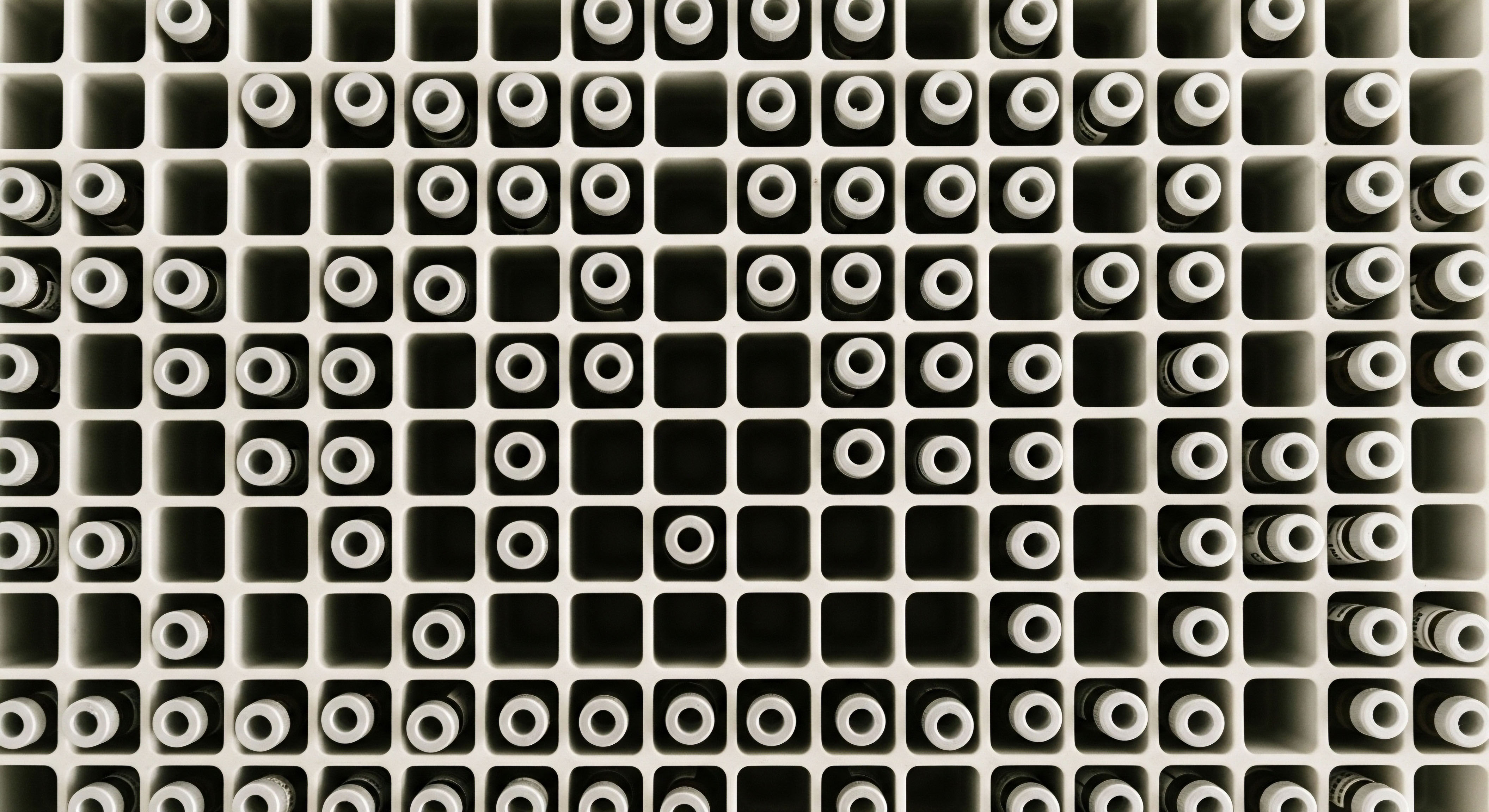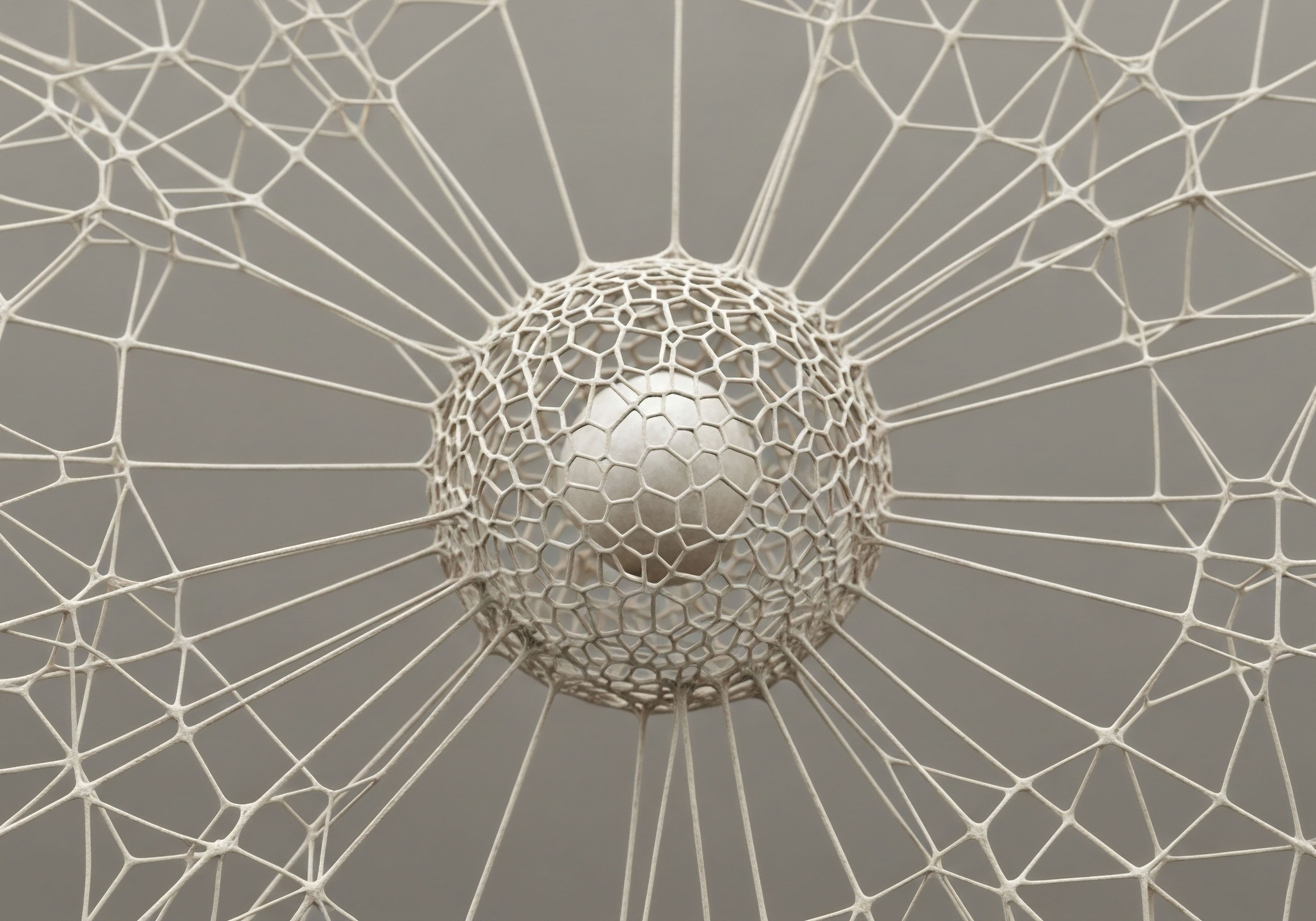

Fundamentals
You may be here because you have received a diagnosis of thyroid autoimmunity, perhaps Hashimoto’s thyroiditis, and you are simultaneously navigating the complex, emotionally charged path of assisted reproductive technology (ART).
You have been told your thyroid hormone levels are “normal,” yet a persistent question remains, a feeling that there is a deeper connection between this immune system signature and the challenges you are facing in your fertility journey. Your intuition is pointing toward a fundamental truth of human biology.
The presence of thyroid antibodies is far more than a simple flag for thyroid gland dysfunction; it is a profound signal from your immune system, indicating a state of heightened surveillance and, in this case, a case of mistaken identity. Understanding this signal is the first step toward recalibrating your body’s internal environment to support the creation of life.
The human body is a marvel of communication. Its systems are in constant dialogue, a dynamic exchange of information that maintains equilibrium, or homeostasis. The endocrine system, which includes your thyroid gland, is a primary author of these messages, using hormones as its chemical language to regulate everything from your metabolic rate to your body temperature.
The immune system, conversely, is the body’s sophisticated defense and surveillance network. It is designed to identify and neutralize threats. Thyroid autoimmunity arises when this defense network misidentifies proteins within the thyroid gland ∞ specifically, thyroid peroxidase (TPO) and thyroglobulin (Tg) ∞ as foreign invaders.
In response, it creates specific antibodies (TPOAb and TgAb) to target and mark these proteins for destruction. The presence of these antibodies in your bloodstream is the definitive sign of this underlying autoimmune process, even when your thyroid is still producing sufficient hormones to keep your Thyroid Stimulating Hormone (TSH) levels within the normal range.

The Thyroid’s Role in the Architecture of Reproduction
To grasp the connection to fertility, we must first appreciate the thyroid’s central role in reproductive physiology. Thyroid hormones act upon virtually every cell in the body, governing the speed and efficiency of metabolic processes. Reproduction is an exquisitely energy-dependent process.
From the maturation of an oocyte (egg) within the ovary to the successful implantation of an embryo in the uterine wall and its subsequent growth, every step demands immense biological resources and precise metabolic control. Your thyroid hormones are the conductors of this metabolic orchestra.
They directly influence ovarian function, regulating the menstrual cycle and ensuring the healthy development of ovarian follicles, the small sacs that house and mature your eggs. They also prepare the endometrium, the lining of the uterus, making it receptive to a developing embryo. A disruption in this hormonal signaling, even a subtle one, can compromise the integrity of this delicate reproductive cascade.
When thyroid antibodies are present, they introduce a layer of complexity. The concern extends beyond the direct health of the thyroid gland itself. The prevailing scientific investigation centers on a few key pathways through which these antibodies might influence ART outcomes. One primary area of focus is the local environment of the ovary.
Research has confirmed that thyroid antibodies can cross the blood-follicle barrier, entering the very fluid that surrounds and nurtures the developing oocyte. This introduces the “follicle hypothesis,” a concept suggesting that the presence of these immune proteins within the follicular fluid may create a cytotoxic, or cell-damaging, environment.
This could directly impact the quality of the maturing egg, potentially reducing its competence for fertilization and healthy embryonic development. It changes the fundamental question from “Is my thyroid working?” to “What is the quality of the environment in which my eggs are developing?”.
The presence of thyroid antibodies signals an immune system process that can influence the reproductive environment, independent of thyroid hormone levels.

Understanding the Immune System’s Broader Conversation
The existence of thyroid autoimmunity also points to a more generalized state of immune activation. An autoimmune condition in one area of the body suggests a predisposition toward immune dysregulation system-wide. This is a critical piece of the puzzle. Successful pregnancy itself requires a unique immunological state.
The maternal immune system must perform a remarkable feat ∞ it must tolerate a semi-allogeneic entity ∞ the embryo, which contains genetic material from both parents ∞ without launching an attack, while simultaneously maintaining its ability to fight off genuine pathogens. This requires a delicate shift in immune posture, moving from a pro-inflammatory state to a more tolerant, anti-inflammatory one.
The presence of an underlying autoimmune process, such as the one indicated by thyroid antibodies, may disrupt this crucial immunological pivot. It may prime the system for a more inflammatory response, potentially affecting the receptivity of the uterine lining or contributing to implantation failure.
This is why your journey with ART is deeply personal and requires a perspective that sees your body as a whole, interconnected system. The signals your body is sending are valid, and they provide the essential clues for developing a therapeutic strategy that looks beyond isolated lab values to support your overall biological well-being.
This foundational understanding shifts the focus. It moves the conversation from a narrow concern about thyroid hormone numbers to a broader, more empowering inquiry into the state of your immune health and its intricate relationship with your reproductive potential. It validates your experience that something more is at play and provides a clear, biologically-grounded framework for asking the right questions and seeking comprehensive support on your path to conception.
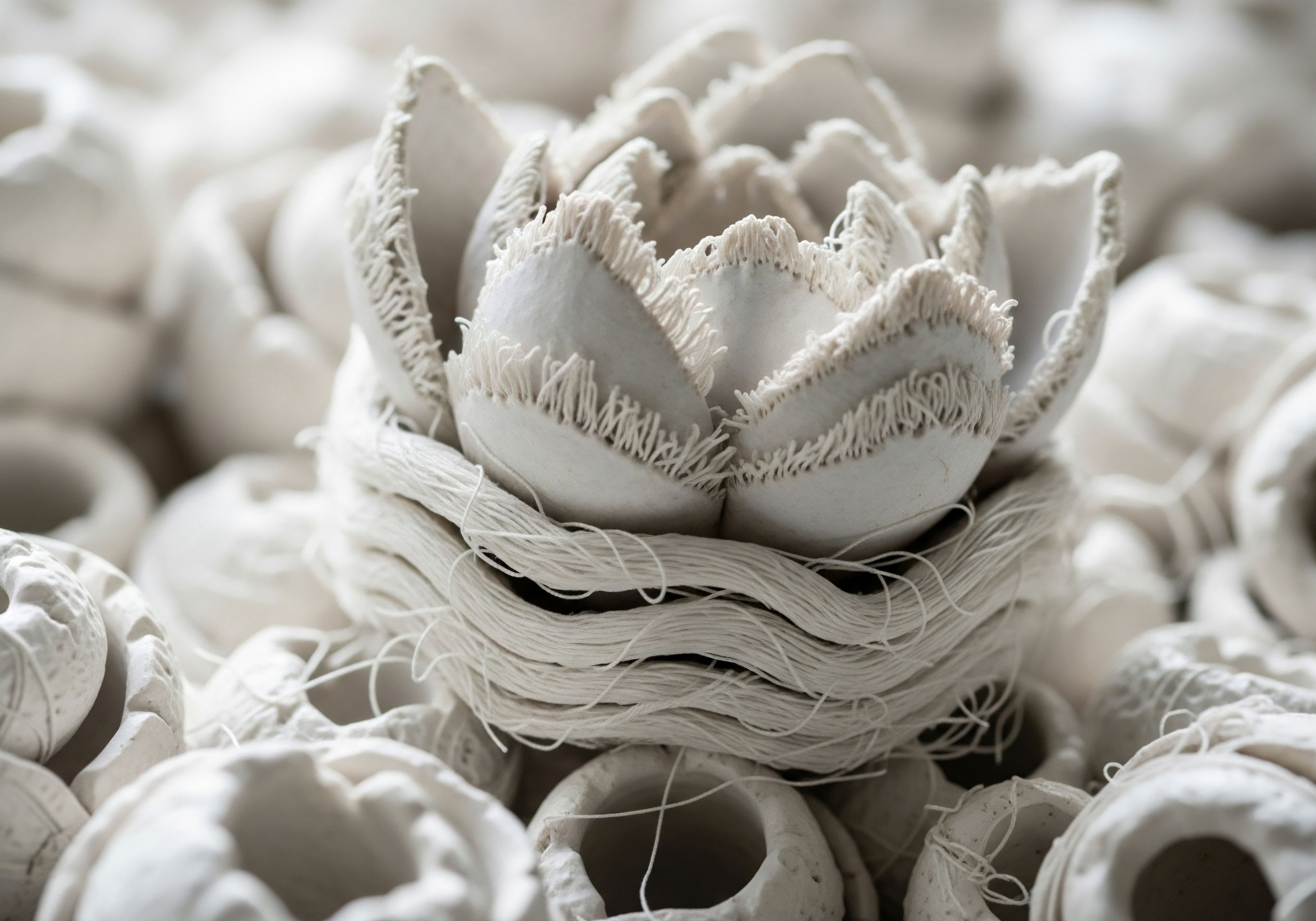
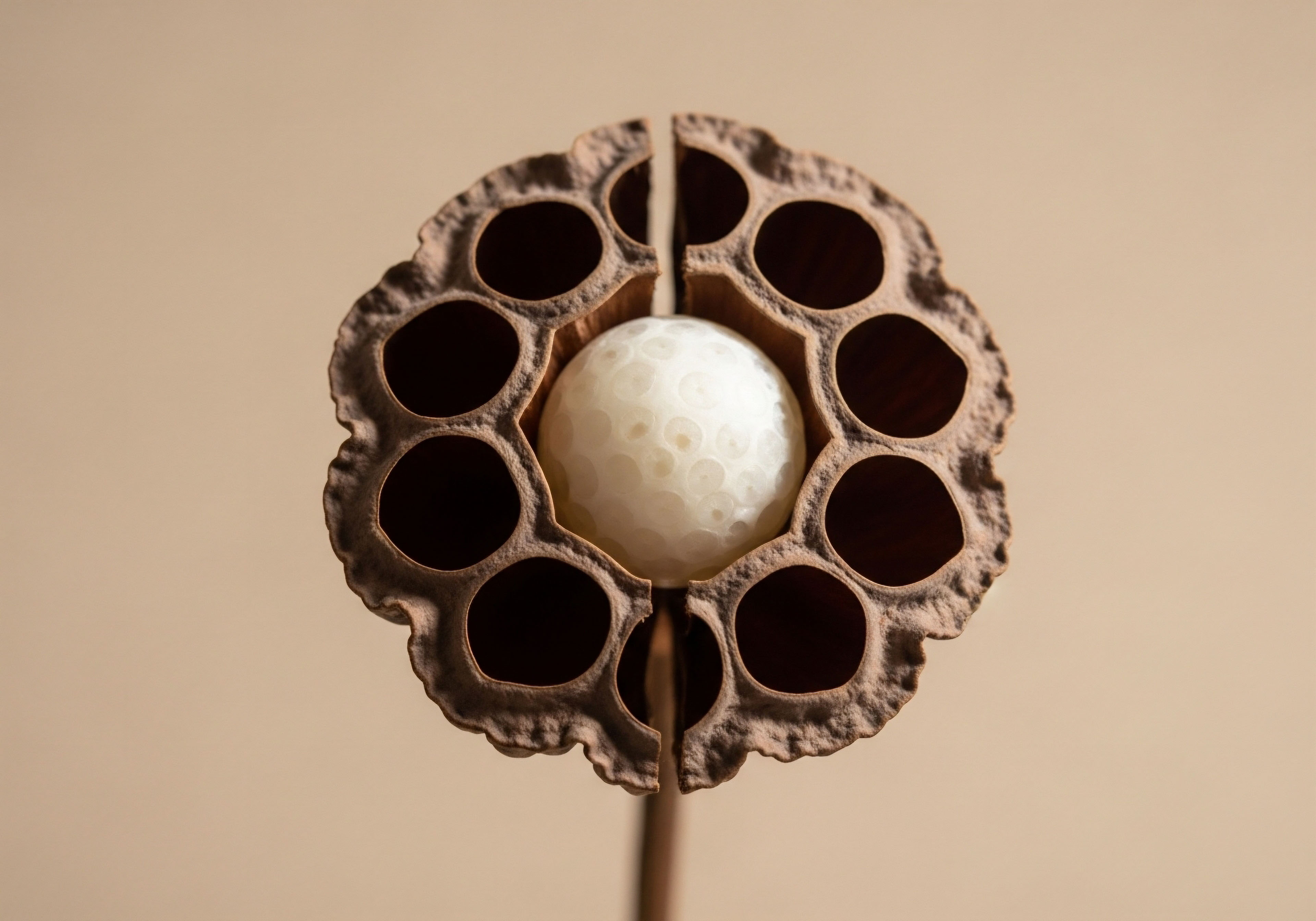
Intermediate
For the individual who has already grasped that thyroid antibodies represent an immune system signal, the next logical step is to dissect the clinical evidence. You are likely asking a very specific and pragmatic question ∞ how, exactly, does the presence of Thyroid Peroxidase Antibodies (TPOAb) or Thyroglobulin Antibodies (TgAb) affect the statistical probabilities of success at each stage of an Assisted Reproductive Technology (ART) cycle?
The clinical literature on this topic presents a complex and often contradictory picture, a reality that can be frustrating for patients and clinicians alike. This lack of definitive consensus stems from significant variations in study design, patient populations, and the specific outcomes being measured. By examining these discrepancies, we can achieve a more sophisticated understanding of the biological mechanisms at play and the clinical nuances that inform treatment decisions.
An ART cycle is a multi-step process, and thyroid autoimmunity (TAI) has been hypothesized to exert an influence at several key junctures. The primary outcomes clinicians and researchers evaluate include the number of oocytes retrieved after ovarian stimulation, the fertilization rate, the quality of the resulting embryos, the clinical pregnancy rate per embryo transfer, and, most importantly, the live birth rate.
A further critical metric is the rate of miscarriage, as TAI has long been associated with pregnancy loss. Examining the data through the lens of these specific milestones reveals where the impact of TAI may be most pronounced and why some studies observe an effect while others do not.

Ovarian Reserve and Oocyte Retrieval
The very beginning of the IVF process involves controlled ovarian hyperstimulation (COH) to produce multiple mature oocytes. The success of this phase is a reflection of a woman’s ovarian reserve ∞ the quantity and quality of her remaining eggs. Some research suggests a link between TPOAb positivity and diminished ovarian reserve.
A 2023 study, for instance, found that euthyroid (having normal thyroid function) women with TPOAb had signs of decreased ovarian reserve function compared to their antibody-negative counterparts. This could manifest as a lower number of oocytes retrieved for a given level of stimulation. The proposed mechanism is a chronic, low-grade inflammation in the ovarian tissue, mediated by the autoimmune process, which could accelerate follicular depletion or impair the response of follicles to hormonal signals.
However, other large-scale studies have failed to corroborate this finding. A 2020 cross-sectional study involving 279 women found that the number of oocytes retrieved was comparable between women with and without TAI. This discrepancy may be explained by the titer, or concentration, of the antibodies.
It is plausible that only high titers of TPOAb are sufficient to exert a clinically significant effect on ovarian function, a detail not always accounted for in every study. Furthermore, the age of the patient population and the specific stimulation protocols used can confound the results, making direct comparisons challenging.

Fertilization Rates and Embryo Quality
Once oocytes are retrieved, the focus shifts to fertilization and early embryonic development. This is where the “follicle hypothesis” becomes particularly relevant. If thyroid antibodies are present within the follicular fluid, they could theoretically compromise oocyte integrity, leading to lower fertilization rates or poorer embryo quality.
The study that identified decreased ovarian reserve also reported that the TPOAb-positive group had decreased embryo quality. High-quality embryos are those that exhibit appropriate cell division patterns and morphology, factors that are predictive of their potential to implant and develop into a healthy fetus.
The impact of thyroid antibodies on ART success is a subject of clinical debate, with some studies showing effects on embryo quality and miscarriage rates while others do not.
Here too, the evidence is divided. The 2020 study by Poppe et al. found no significant differences in fertilization rate or embryo quality between their study groups. This suggests that while the antibodies may be present, they may not always be pathogenic to the oocyte or early embryo.
The reasons for this could be multifactorial. The specific epitope the antibody targets on the TPO protein could matter, or perhaps the effect is only seen in conjunction with other subtle metabolic or inflammatory factors that are not universally present in all women with TAI.
| ART Outcome Metric | Evidence Suggesting Negative Impact | Evidence Suggesting No Impact |
|---|---|---|
| Ovarian Reserve / Oocytes Retrieved |
Associated with decreased ovarian reserve function in some studies. The proposed mechanism involves chronic inflammation affecting follicular health. |
Large cross-sectional studies have found no significant difference in the number of oocytes retrieved. |
| Fertilization Rate |
Theoretically could be reduced due to cytotoxic effects of antibodies in follicular fluid on oocyte quality. |
Multiple studies report no statistically significant difference in fertilization rates between TAI-positive and negative women. |
| Embryo Quality |
Some research indicates a higher proportion of poor-quality embryos in TPOAb-positive women. |
Other analyses have found embryo quality to be comparable regardless of antibody status. |

Implantation, Pregnancy, and Miscarriage Rates
The most critical and consistently observed association is the link between TAI and pregnancy loss. Even when oocyte retrieval, fertilization, and embryo development appear normal, women with thyroid antibodies often face a higher risk of miscarriage following ART.
A meta-analysis of 12 studies concluded that the presence of thyroid antibodies significantly increased the risk of early miscarriage in women undergoing IVF/ICSI. This finding points away from a primary problem with the embryo itself and toward an issue with the maternal environment, specifically the process of implantation and the establishment of a healthy pregnancy.
The underlying mechanism is thought to be immunological. The endometrium must be receptive, and the maternal immune system must adapt to tolerate the embryo. TAI may be a marker of a generalized immune dysregulation that hinders this process.
It could be associated with a more pro-inflammatory uterine environment, altered populations of uterine natural killer (uNK) cells, or other factors that create a hostile environment for the implanting embryo. This helps explain why a perfectly graded embryo might still fail to result in a live birth. It is this increased risk of miscarriage that often drives the clinical conversation about potential interventions.

What Are the Potential Interventions for TAI in ART?
Given the association with adverse outcomes, particularly miscarriage, researchers have investigated several interventions for euthyroid women with TAI undergoing ART. The approaches are varied and, like the problem itself, their efficacy is still debated.
- Levothyroxine (LT4) Supplementation ∞ The most common approach is to treat euthyroid TAI women with low-dose levothyroxine, the synthetic form of the body’s main thyroid hormone. The rationale is twofold. First, women with TAI have a reduced thyroid reserve and are at higher risk of developing subclinical or overt hypothyroidism in response to the physiological stress and hormonal shifts of ovarian stimulation and pregnancy. Proactively treating with LT4 ensures thyroid hormone levels remain optimal. Second, some evidence suggests LT4 may have immunomodulatory effects, although this is less established. The effectiveness of this strategy is a major point of contention, with some trials showing a benefit in reducing miscarriage rates and others showing none.
- Selenium Supplementation ∞ Selenium is a crucial cofactor for the enzymes that produce and convert thyroid hormones, and it also plays a role in immune function. Some studies have shown that selenium supplementation can reduce TPOAb titers during pregnancy. However, a clear link between this reduction in antibodies and improved fetal or maternal outcomes has not been consistently demonstrated.
- Glucocorticoids ∞ As powerful immunosuppressants, medications like prednisone have been studied to see if they can dampen the autoimmune response during the implantation window. While some early research showed promise in increasing pregnancy rates, more recent studies suggest that while they may improve initial pregnancy outcomes, they do not appear to reduce the subsequent risk of miscarriage. Their use is limited by potential side effects.
This intermediate level of analysis reveals a clinical landscape defined by uncertainty. The data suggest that the primary impact of TAI in euthyroid women may lie in the post-transfer phase, affecting implantation and increasing the risk of pregnancy loss. The inconsistencies in the literature underscore the reality that TAI is not a monolithic condition.
The effect on an individual’s ART journey likely depends on a confluence of factors, including antibody titer, the specific nature of her immune response, her age, and other co-existing health factors. This complexity demands a personalized approach, one that weighs the potential benefits of intervention against the lack of definitive evidence, all within the context of a patient’s specific clinical picture and personal values.

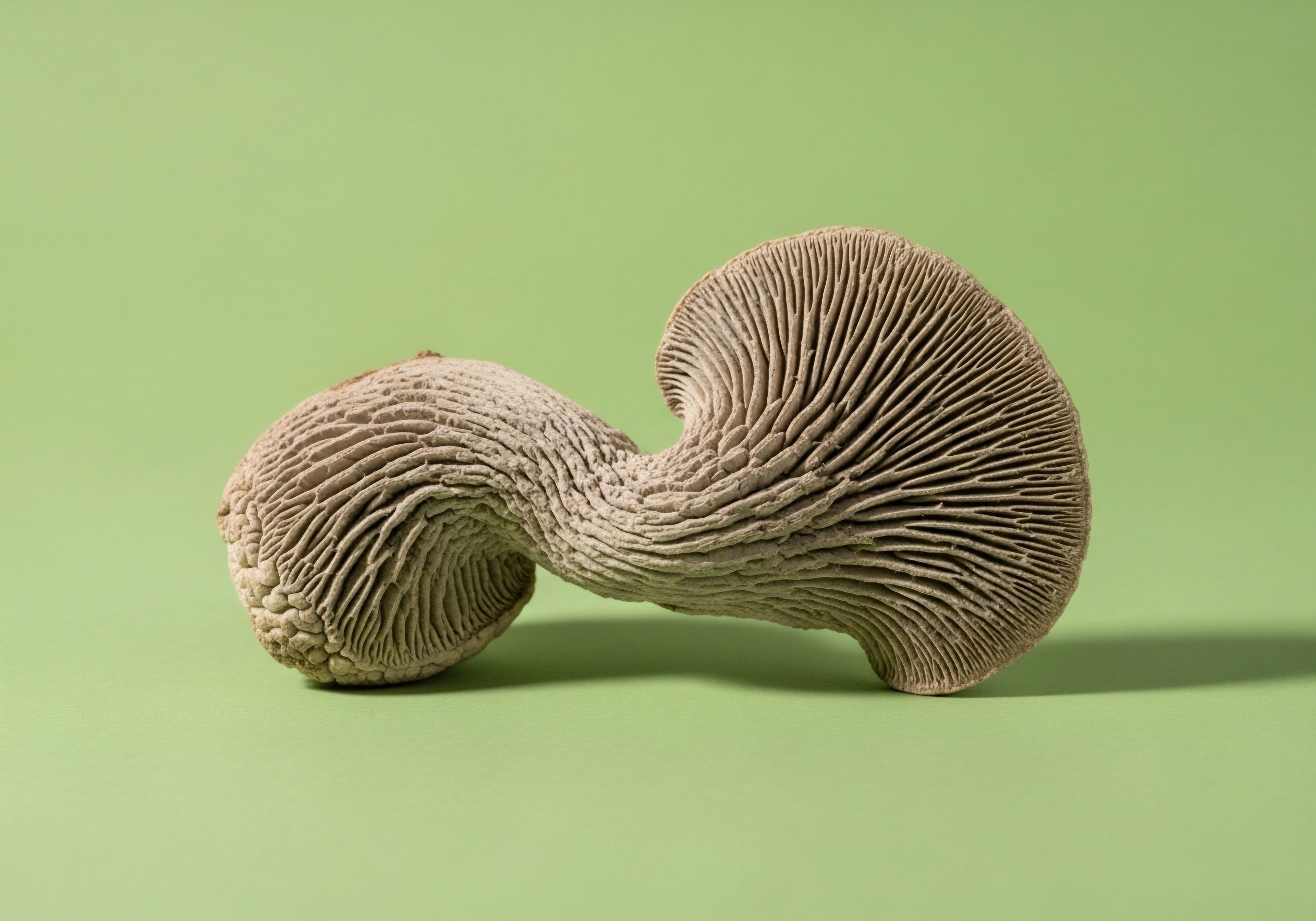
Academic
An academic exploration of the relationship between thyroid autoimmunity (TAI) and assisted reproductive technology (ART) outcomes necessitates a move beyond simple correlation and into the complex realm of systems biology and immunopathology. The presence of anti-thyroid peroxidase (TPOAb) or anti-thyroglobulin (TgAb) antibodies in a euthyroid individual is not a localized pathology.
It is the clinical signature of a systemic immune dysregulation with far-reaching consequences for the exquisitely orchestrated immuno-endocrine crosstalk required for successful reproduction. The conflicting results in clinical literature arise, in large part, from viewing TAI as a binary variable (positive vs.
negative) instead of as a manifestation of a deeper, continuous spectrum of immune activation. The central thesis is this ∞ TAI acts as a systemic inflammatory catalyst that disrupts the delicate Th1/Th2/Th17/Treg immune balance essential for endometrial receptivity and maternal-fetal tolerance, thereby compromising ART outcomes primarily at the level of implantation and early placentation.

The Concept of Euthyroid Autoimmunity a Deeper Look
The term “euthyroid” itself warrants critical examination in this context. It is a clinical definition based on a serum TSH level falling within a statistically-derived reference range. This definition, while practical, can be biologically misleading. An individual with high-titer TPOAb is, by definition, experiencing an active autoimmune assault on their thyroid gland.
The gland may be compensating adequately by increasing its output to maintain a normal TSH, a state sometimes referred to as compensated hypothyroidism. This state of compensation requires increased physiological effort and may mask a subtle insufficiency of thyroid hormone at the tissue level, which is not reflected in serum TSH.
Furthermore, the ovarian hyperstimulation protocols used in ART, with their supraphysiological levels of estrogen, place a significant stress on the thyroid gland, increasing thyroid hormone binding globulin (TBG) and the overall demand for thyroid hormone.
A gland already under autoimmune siege is less equipped to meet this demand, making TAI-positive women more susceptible to developing subclinical or overt hypothyroidism during the ART cycle itself. This potential for thyroid dysfunction mid-cycle is a significant confounding variable that complicates the interpretation of studies on purely “euthyroid” women.

How Does Immune Dysregulation Manifest at the Maternal-Fetal Interface?
Successful implantation is contingent upon a profound local and systemic immunological shift. The endometrium in the peri-implantation window is typically dominated by T-helper 2 (Th2) cells, which produce anti-inflammatory cytokines like IL-4 and IL-10, and regulatory T cells (Tregs), which actively suppress inflammatory responses. This creates a state of immune tolerance.
TAI is fundamentally a Th1-mediated autoimmune condition, characterized by pro-inflammatory cytokines such as Interferon-gamma (IFN-γ) and Tumor Necrosis Factor-alpha (TNF-α). The presence of TAI, even when clinically euthyroid, is associated with a systemic skewing toward a Th1-dominant immune profile.
This systemic bias can translate to the uterine environment. A Th1-dominant endometrium is hostile to an implanting embryo. IFN-γ and TNF-α can impair trophoblast invasion, promote apoptosis in placental cells, and disrupt the development of the spiral arteries necessary for establishing a robust blood supply to the fetus.
Therefore, the embryo, regardless of its intrinsic quality, may fail to implant or may miscarry early due to this immunologically inhospitable uterine environment. The increased miscarriage rate seen in TAI-positive women undergoing ART is the most compelling clinical evidence for this hypothesis.
Thyroid autoimmunity reflects a systemic immune imbalance that can disrupt the precise inflammatory control required for successful embryo implantation.
| Mechanism | Description of Pathophysiology | Primary ART Outcome Affected |
|---|---|---|
| Direct Ovarian Cytotoxicity |
Thyroid antibodies cross the blood-follicle barrier and enter the follicular fluid. They may exert direct cytotoxic effects on granulosa cells or the oocyte itself, or induce an inflammatory microenvironment that impairs oocyte maturation and competence. |
Oocyte Quality, Embryo Quality, Fertilization Rate |
| Systemic Pro-Inflammatory State |
TAI is a Th1-mediated condition. This systemic bias toward pro-inflammatory cytokines (IFN-γ, TNF-α) can influence the entire reproductive axis, creating a state less conducive to conception. |
General Fertility, Implantation Rate |
| Impaired Endometrial Receptivity |
The systemic Th1 bias translates to the uterine lining, disrupting the necessary shift to a Th2/Treg dominant environment. This creates an immunologically hostile endometrium, impairing trophoblast invasion and implantation. |
Implantation Rate, Clinical Pregnancy Rate, Miscarriage Rate |
| Reduced Thyroid Reserve |
The autoimmune process compromises the thyroid gland’s ability to respond to the increased hormonal demands of ovarian stimulation and pregnancy, leading to transient or subclinical hypothyroidism which negatively impacts reproductive processes. |
All stages, particularly early pregnancy maintenance |
| General Autoimmune Marker |
TAI may not be directly causal but may act as a sensitive marker for a global predisposition to autoimmunity. Women with TAI may have other, unmeasured autoantibodies or immune dysfunctions that are the true culprits in reproductive failure. |
General Fertility, Miscarriage Rate |

What Is the Role of Antibody Titers in Clinical Outcomes?
The academic discourse is increasingly moving toward a quantitative, rather than qualitative, assessment of TAI. Many studies that found no association simply stratified patients as TPOAb-positive or -negative. However, emerging evidence suggests a dose-dependent effect. A 2023 study specifically stratified TPOAb-positive women into low-titer and high-titer groups.
It found that while both groups had higher miscarriage rates than controls, the live birth rate was significantly lower in the high-titer group (13.95%) compared to the low-titer group (32.56%). This is a critical finding.
It suggests the existence of a pathogenic threshold, where the concentration of antibodies becomes sufficient to exert a clinically meaningful detrimental effect, either through direct cytotoxicity in the ovary or by inducing a more profound systemic immune shift. Future research must move toward quantifying antibody levels and correlating them with specific cytokine profiles and clinical outcomes to refine our understanding and therapeutic strategies. This quantitative approach may resolve many of the apparent contradictions in the existing literature.
In conclusion, a sophisticated academic perspective frames thyroid autoimmunity as a systemic immunological condition, not an isolated endocrine issue. Its influence on ART outcomes is likely multifactorial, involving a combination of reduced thyroid reserve, direct ovarian effects, and, most critically, the disruption of the maternal immune tolerance necessary for implantation and pregnancy maintenance.
The increased risk of miscarriage is the strongest signal of this phenomenon. The conflicting data in the field likely reflects a failure to account for the continuous nature of immune activation, particularly the pathogenic significance of high antibody titers.
For the clinician and the patient, this means that a positive TPOAb result in a euthyroid woman is a clinically relevant piece of data that warrants a deeper conversation about the potential immunological challenges to a successful ART outcome and a careful, personalized consideration of immunomodulatory and supportive therapies.

References
- Busnelli, A. et al. “The impact of thyroid autoimmunity on IVF/ICSI outcome ∞ a systematic review and meta-analysis.” Human reproduction update 22.5 (2016) ∞ 1-1.
- Poppe, K. et al. “Thyroid autoimmunity and hypothyroidism before and during pregnancy.” Human reproduction update 14.5 (2008) ∞ 431-455.
- Unuane, D. and K. Poppe. “Thyroid disorders and in vitro outcomes of assisted reproductive technology ∞ an unfortunate combination?.” Thyroid 30.2 (2020) ∞ 297-305.
- Cai, Yanyan, et al. “TPOAb positivity can impact ovarian reserve, embryo quality, and IVF/ICSI outcomes in euthyroid infertile women.” Systems Biology in Reproductive Medicine 69.2 (2023) ∞ 144-152.
- Rao, M. et al. “Thyroid autoimmunity in adverse fertility and pregnancy outcomes ∞ timing of assisted reproductive technology in AITD women.” American Journal of Reproductive Immunology 85.4 (2021) ∞ e13389.
- Monteleone, P. et al. “Female infertility related to thyroid autoimmunity ∞ the role of autoantibodies.” Frontiers in endocrinology 9 (2018) ∞ 26.
- Vissenberg, R. et al. “Is there a role for levothyroxine in euthyroid women with recurrent miscarriage?.” Human Reproduction 27.3 (2012) ∞ 633-639.
- Stagnaro-Green, A. and E. E. Glick. “Thyroid autoimmunity and the risk of miscarriage.” Best practice & research Clinical endocrinology & metabolism 25.4 (2011) ∞ 621-631.

Reflection
You have now journeyed through the intricate science connecting your immune system’s signals to your reproductive health. This knowledge is a powerful tool. It transforms uncertainty into understanding and allows you to engage with your health from a position of clarity.
The data, with all its complexities and contradictions, points toward a central truth ∞ your body functions as an integrated whole. The presence of thyroid antibodies is a message inviting you to look deeper into your unique biology, to consider the interplay between your endocrine and immune systems, and to recognize how this internal environment shapes your potential for creating life.
This understanding is the starting point. The path forward is one of personalization. It involves seeing these clinical findings not as a definitive verdict, but as essential information to be woven into the broader context of your life and your health. What is the next chapter in your personal health story?
How can this knowledge empower you to build a collaborative partnership with your clinical team, to ask more precise questions, and to advocate for a therapeutic strategy that honors the complexity of your body? The ultimate goal is to cultivate an internal state of balance and resilience, creating the optimal foundation for the journey ahead.
